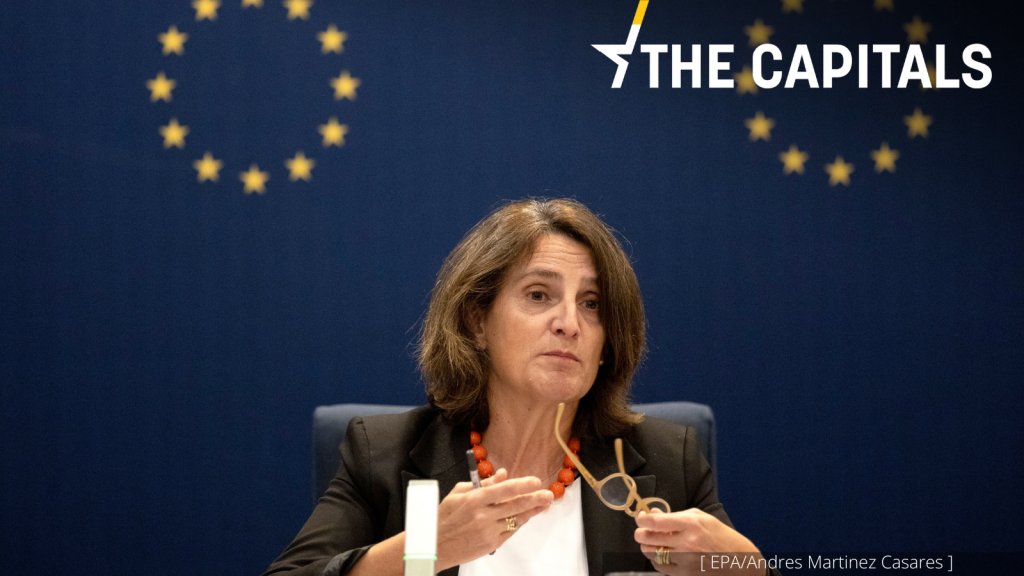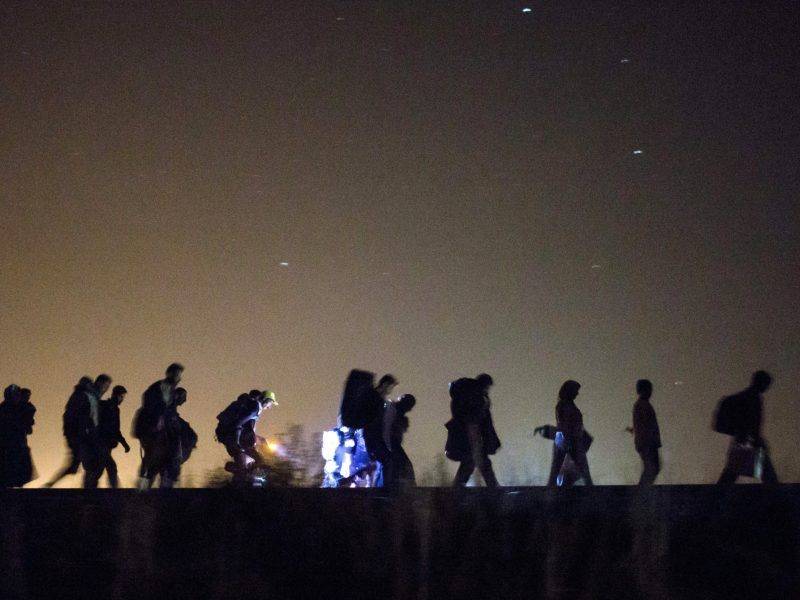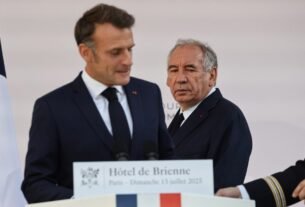Good Monday morning. This is Eddy Wax, with Nicoletta Ionta. Welcome back to The Capitals.
Just four days to go: This newsletter will soon relaunch under a brand-new name. Stay tuned to be among the first to find out.
We’ve also been working on your reading experience. Later this week, expect a refreshed Euractiv website with a new look and added features.
Need-to-knows:
- France: PM François Bayrou braces for defeat in a confidence vote today
- Norway: Voters head to the polls in a tight race
- Putin: Donald Trump readies ‘second phase’ of Russia sanctions
Today’s edition is powered by the European Commission
Big breakthroughs begin with bold ideas. Join us at the European Research and Innovation Days 2025 with Commissioner Ekaterina Zaharieva on 16 and 17 September for two days of debate, live testimonials and forward-looking sessions on the future of European competitiveness and resilience. Be part of shaping EU policy!
Register now.
In the capital
The EU fined Google €2.95 billion last Friday for abusing its dominance in the adtech market – but no official fronted the decision.
There was a statement, not a press conference. It was the second time this year Teresa Ribera has been absent from such a moment, my colleague Anupriya Datta pointed out to me.
In April, the Commission’s competition chief was in Mexico when the EU signed off on €700 million in fines against Meta and Apple. This time she is in Ethiopia for a climate summit.
The silence was conspicuous. Brussels has already made huge concessions to US interests on trade and defence this year – and now Donald Trump looms over Europe’s antitrust laws, treating them as proof the EU is out to get him.
Earlier last week, Ribera’s colleague Maroš Šefčovič mysteriously intervened to delay the Google decision – without explaining why. But the fact that Trump on Friday finally signed a long-awaited executive order to bring down tariffs for EU car exporters (they still stand at an eye-watering 15%) hints at what may have been on his mind.
Trump was unsurprisingly enraged at the news, and he threatened to retaliate, Anupriya reported. Some experts even suggested that, for all its headline size, the fine was lighter than it could have been.
It’s a far cry from the days when Ribera’s predecessor Margrethe Vestager bestrode the stage, turning bullish antitrust enforcement into a showcase of Europe’s power and principles.
By contrast, the Brussels press corps was palmed off with an emailed statement from Ribera late on Friday afternoon, a “technical briefing” that produced nothing quotable, and a LinkedIn video from a mid-rank official.
Yet Ribera is hardly silent elsewhere. She has texted Politico, given an interview to the FT (at least her fourth this year), and last week called Israel’s war in Gaza a “genocide.” The Commission distanced itself from the allegation just hours before the Google fine was made public.
So, is Brussels deliberately downplaying its antitrust muscle to avoid provoking Trump? Or is Ursula von der Leyen reining in Ribera for straying from the EU position – and broadcasting the Spanish socialists’ line – on the Middle East?
Perhaps both.
Bayrou on the brink
French PM François Bayrou appears headed for defeat in today’s confidence vote, with both the far-right National Rally and the Socialists joining forces to topple him.
His fall would force Emmanuel Macron to weigh a spectrum of tenuous options: double down on his centrists, gamble on the Socialists, or draft a caretaker technocrat in hopes of calming looming protests and jittery creditors.
Macron has already ruled out resigning or dissolving parliament, my colleague Laurent Geslin writes in his piece ranking the odds of each scenario. He’s expected to cling to his fractious “central bloc,” but with just 210 deputies in a chamber of 577, it looks like a final roll of the dice.
Coordinated tariffs on China?
Trump said over the weekend he’s ready to move to “the second phase” of sanctions on Russia, reflecting growing exasperation with Vladimir Putin’s resolute refusal to end the war in Ukraine. Trump didn’t provide specifics, and he has made similar threats for months without following through.
The US president also said EU leaders are set to visit the US today or tomorrow to discuss ending the war and that he would speak to Putin in the coming days.
US Treasury Secretary Scott Bessent, in a TV interview, suggested closer EU-US coordination on sanctions, revealing that Trump and Vice President JD Vance spoke with von der Leyen on Friday, followed by his own call with her. Von der Leyen is yet to comment.
If Brussels and Washington could “do more sanctions, secondary tariffs on the countries that buy Russian oil, the Russian economy will be in full collapse and that will bring Putin to the table,” Bessent said.
He did not name names, but China and India are key buyers of Moscow crude – as awkwardly, are EU members Hungary and Slovakia. His remarks echoed those of former US Vice President Mike Pence, who, in an interview with Euractiv on Friday, urged Europe to increase pressure on Russia.
Muted EU debate in Norway’s election
The EU is a quiet undercurrent in Norway’s national election today. Politicians have admitted that the cost of staying outside is rising “by the day” and promised to work on the backlog of unimplemented EU legislation.
But with 55% of Norwegians against membership and only 3-4% citing the EU as an important election issue, the debate remains muted, Jacob Wulff Wold reports. The right-wing populist Progress Party, the country’s second largest party polling at 18.9%, has talked about renegotiating parts of the EEA agreement – though it, and other parties, know that won’t happen.
The governing Labour Party, leading at 29.5%, are defenders of the EEA, yet have pledged not to implement mandated EU energy rules in the next four years. Labour heads a centre-left coalition and is projected to secure a 91-78 seat majority.
Lawmakers challenge Bardella’s debate
Leaders of S&D, Renew and the Greens have asked Roberta Metsola, the Parliament’s president, to rein in the Patriots for Europe. The far-right group has tabled a debate on migration for Wednesday with the title: “Time to end mass migration now – protect our women and children.”
PfE was able to secure a slot on the agenda under a rule allowing each political group one annual debate request, given it aligns with EU values. The joint letter said that this one does not, arguing it violates “human dignity, non-discrimination, tolerance and equality.”
If the title is not changed, the leaders said, the debate should be thrown out. MEPs will discuss it at 5 p.m. today in Strasbourg.
The capitals
BUDAPEST
PM Viktor Orbán said yesterday that the 2026 election would determine whether Hungary is prepared to be independent or risk “chaos and poverty” by embracing the EU, which he claimed is “falling apart in front of our eyes.” The longtime leader, in power since 2010, is under pressure from stagnation and high inflation, while his centre-right challenger, Péter Magyar, has surged ahead in most polls with pledges to unlock suspended EU funds, fight corruption, and make the country a “credible member” of the bloc and NATO.
BERLIN
Andriy Melnyk, Ukraine’s outspoken former ambassador to Berlin, has issued an apology for the forceful language he used toward Germany in the early stages of Russia’s invasion. Known for chastising Berlin’s hesitation on weapons aid – and for calling then-Chancellor Olaf Scholz an “offended liver sausage” – Melnyk said his words were impulsive and meant to rally support at home. President Volodymyr Zelenskyy dismissed him from the post about six months into the war.
MADRID
Pro-independence Catalan party ERC will table its proposal for a new fiscal scheme today, which would give Catalonia full control over collecting, managing, and spending its taxes. ERC leader Oriol Junqueras has warned PM Pedro Sánchez that approving this “unique financing model” is a pre-condition for backing Spain’s 2026 state budget. The plan would require 176 votes in Congress to amend Spain’s regional financing law, and faces opposition from conservatives and coalition allies, including separatist rival Junts.
WARSAW
The government has moved to narrow free healthcare for Ukrainians, adopting an amendment to a law that would strip uninsured refugees of services such as dental care, rehabilitation and spa treatment. Children, the insured, and those injured by the war are spared, but ministers insist the change is needed to ease costs and shield resources for Polish citizens.
VALLETTA
Alex Borg has been confirmed as Malta’s new Nationalist Party leader, winning by just 44 votes with 50.1% support. In his first address, he vowed to strengthen and unite the PN, move beyond partisan divides, and provide “hope” for change, while accusing the governing Labour Party of fearing early elections against a revitalised opposition.
BUCHAREST
Senators and deputies in this capital on Sunday voted down four no-confidence motions pushed by far-right parties after the government assumed responsibility for its second fiscal package. PM Ilie Bolojan’s plan, aimed at cutting a deficit above 9% – the EU’s highest – has already angered teachers, pensioners and civil servants, and now faces protests as well as a Constitutional Court ruling.
Also on Euractiv
EU member states are set to discuss a new draft compromise expanding the “safe third country” principle, which permits asylum seekers to be sent outside the bloc if protection is available elsewhere.
The proposal loosens the definition of a migrant’s “connection” and would, in limited cases, allow the transfer of unaccompanied minors so long as it complies with international law.
In Berlin, fiscal arithmetic has become geopolitical.
The coalition’s latest budget deal slashes €1.7 billion from foreign aid, the lone cut in an otherwise expansive plan, unsettling even some in government ranks.
To critics, the decision signals a retreat from Germany’s self-proclaimed role as a guarantor of global partnership – a retreat that comes just as China and Russia deepen their reach abroad.
Agenda
French PM Bayrou faces vote of no confidence
Norwegian parliamentary election
Informal meeting of agriculture ministers in Denmark
EP plenary kicks off in Strasbourg at 5 p.m., with debates on investment financing reforms, vehicle circularity rules, public procurement, and renewing the Internet Governance Forum mandate.
Costa visits Finland, Sweden, and Estonia. He meets Finnish PM Orpo and President Stubb, Swedish PM Kristersson, and Estonian PM Michal
Contributors: Anupriya Datta, Jacob Wulff Wold, Laurent Geslin, Nick Alipour, Catalina Mihai, Inés Fernández-Pontes, Aleksandra Krzysztoszek
Editors: Christina Zhao, Sofia Mandilara






